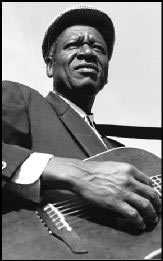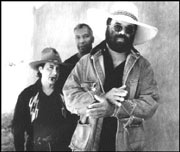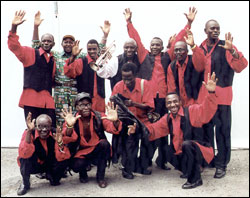DJELIMADY TOUNKARA &
BOUBACAR TRAORɍ
On the Boards, 100 W. Roy St., 206-217-9888, $20
8 p.m. Sun., Nov. 3
MALI IS A LAND of music. From the spare, primal blues of Ali Farka Toure in the north to the vocal wailing of diva Oumou Sangar頩n the southern Wassoulou region, music is an integral part of Malian life. Seattle audiences will get a rare chance to experience two of the country’s legendary exports, Djelimady Tounkara and Boubacar Traor鬠as the pair share a bill this week as part of the Earshot Jazz Festival.
For the uninitiated, Tounkara is, quite simply, one of the world’s finest guitarists. As the leader of the Super Rail Band for over three decades, he established his reputation as one of the most fluent and inventive masters on the fretboard, merging the traditional sounds of the epic Sundiata songs with the supple rhythms of Cuban dance music. While Tounkara has been a constant presence in the group (even when they spent time in the Ivory Coast as the Rail Band International), it’s seen many vocalists go through the ranks, including future stars Salif Keita and Mory Kant鬠both of whom have gone on to international acclaim.
Through it all, the talented Tounkara’s managed to keep a relatively low profile. But over the past few years, his name has become more widely known. He was the subject of the excellent book In Griot Time, by journalist Banning Eyre, and more recently released a solo album, Segui, whose rich acoustic tones further highlighted his genius.
For Boubacar Traor鬠music has long been a salvation. The singer-songwriter, affectionately known as Kar Kar, was part of the country’s national identity when independence came in the early ’60s. Every morning he was on the radio singing; the words to his anthem, “Mali Twist,” were everywhere. But the man from Keyes—in the arid western region of the country—still had a family to support, so he worked, among other things, as a tailor and shopkeeper, with music taking a back seat for much of the next two decades. After his wife, Pierrette, died in the late ’80s, he abandoned both music and Mali, moving to Paris and working construction. By a lucky coincidence, a British label found him and pushed him back into the recording studio, and his career was reborn. Eventually returning to Mali, he now makes music full time, most recently on 2000’s Macir鼯I>, and last year Traor頣ollaborated with Bill Frisell on an as-yet unperformed commission. Traor駳 rediscovery was celebrated in director Jaques Sarasin’s award-winning documentary I’ll Sing for You.
Two national treasures, one country, and the richness of Malian music—how can anyone refuse?









